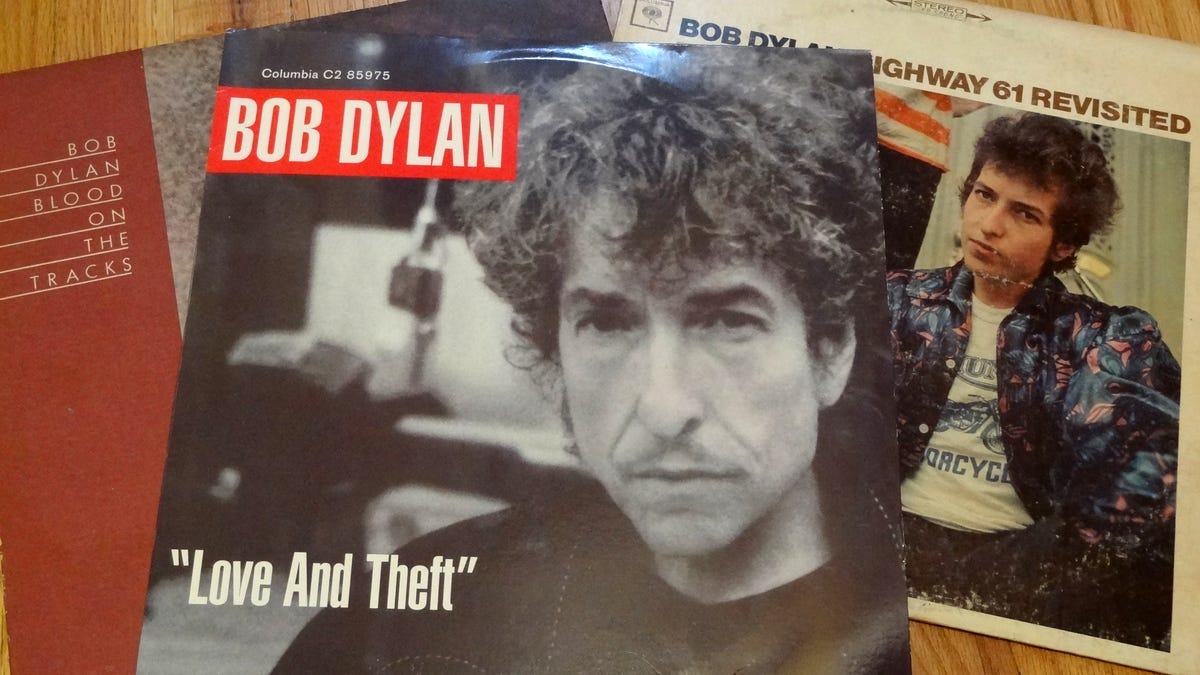How electric Bob Dylan made it OK to rock the folk
Commentary: In '65, Bob Dylan officially melded folk and rock with a controversial live electric gig. The Nobel winner's move still resonates through hearts and guitar strings today.

No matter how the years pass, one historic event will forever follow Bob Dylan, who was named a Nobel laureate Thursday. Let's revisit that fateful moment at the Newport Folk Festival in Rhode Island.
It was 1965, and Dylan strolled on stage with a Fender Stratocaster guitar and dropped an electric bomb on the acoustic folk movement.
It was a critical juncture in music history. It set the tone for cross-genre musicians like me and the folk/rock/country/blues band I play in. It made it OK to be a troubadour without being defined by whether you needed an electrical outlet.
At the time, some audience members booed, though accounts vary as to whether that was due to the Strat's supposedly sacrilegious presence or, as musician Al Kooper told The Village Voice, due to the shortness of the set.
Still, the legend was born that folk devotees were shocked and appalled at Dylan plugging in. If they were, they shouldn't have been. (It's also not surprising that in recent years the iconic singer has popped up in an oddball IBM commercial and released an interactive video version of "Like a Rolling Stone.")
The secret isn't that Dylan is an early adopter, but rather that he's a retro adopter. When he pulled out that electric guitar, he was mining his own past and paying tribute to his '50s childhood rock 'n' roll heroes like Elvis Presley, Little Richard and Billy Lee Riley.
It's his sense of fusion -- of melding rock, folk, country, poetry and blues together -- that propels his music with a timeless authority. As Dylan himself said in his MusiCares Person of the Year speech at the Grammys last year, "All these songs are connected. Don't be fooled. I just opened up a different door in a different kind of way."
Dylan received the Nobel Prize in Literature Thursday "for having created new poetic expressions within the great American song tradition." Hearing the news and seeing the world's reverential reaction reminds me of the first time I experienced those poetic expressions in person.
It's 1992. I'm a kid in Little Rock, Arkansas. I save up my allowance, stand in line at a local music store and buy my first concert ticket for a Bob Dylan show. I am just learning how to play guitar and I study hard on Dylan's songwriting, from the rough-hewn folk of his very first album to the shivering atmospheric rock of "Oh Mercy."
I'm at the gig. Arkansas rocker Billy Lee Riley joins Dylan on stage.
Riley's big 1957 hit "Red Hot" was overshadowed by the rising popularity of Jerry Lee Lewis and "Great Balls of Fire." Riley may be unfairly relegated to footnote status in rock history, but he remains in the forefront of Dylan's mind and heart to this day.
At the '90s gig, Dylan calls him "my hero" when he brings him on stage. They play "Red Hot" together and it's rock 'n' roll to the core.
This is why it made sense for Dylan to go electric. The electricity was always in him.
Today, I still write songs and play guitar in Americana band The Dawn Hotel. I shift between a pink sparkle Telecaster and a worn 1964 Gibson acoustic. Nobody boos me when I plug in. It's seamless. I can thank Dylan for harnessing the wave and bridging the imaginary divide between rock and folk all those decades ago.
It's been 24 years since my first Dylan concert. I have a ticket to hear him again Tuesday in Albuquerque, New Mexico. I'll be telling everybody, "Sorry, I'm busy that night. I have to go see a Nobel laureate." And I'll sit in the audience, feeling like a kid in Little Rock, as the soundtrack of my lifetime fills my ears.

